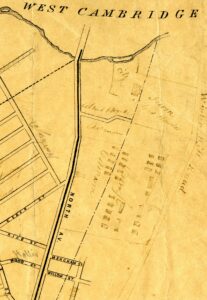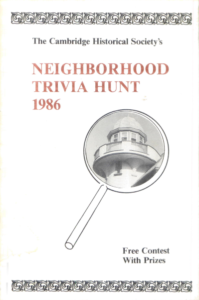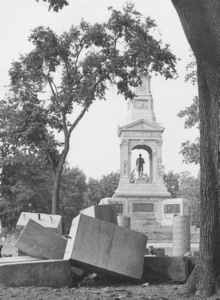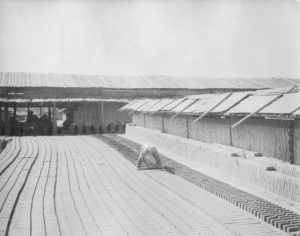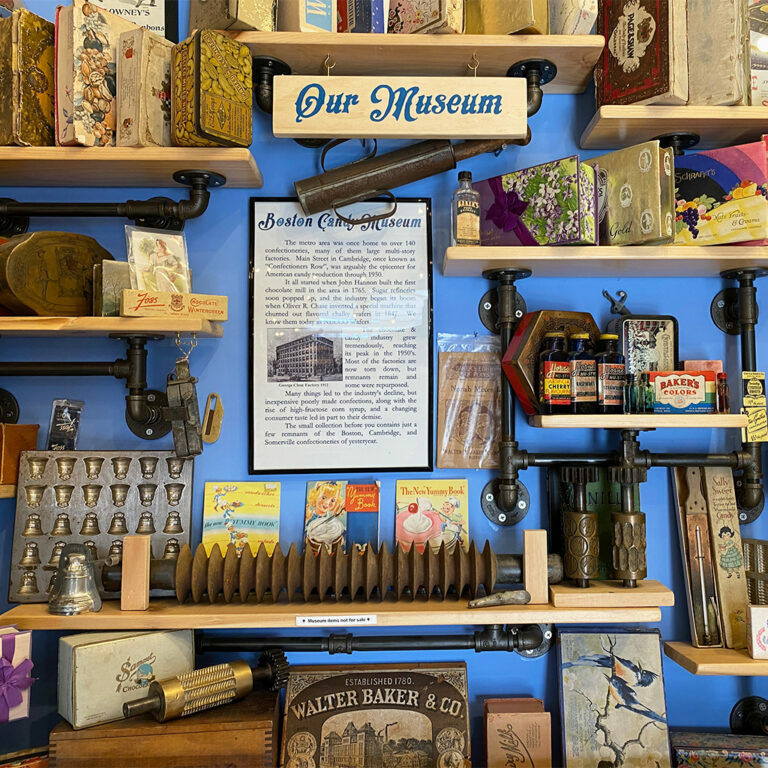
You can treat your Valentine at one of North Cambridge’s historic businesses
Above Image: A section of Spindler Confections in North Cambridge is dedicated to a Candy Museum showcasing local confections of the past. (Photo: Marc Levy)
By Beth Folsom
The legend of St. Valentine can be traced back to the third century C.E., although the exact identity of the saint is murky. The Catholic Church recognizes at least three different martyred saints named Valentine (or Valentinus), including a Roman priest, an Italian bishop and a heroic prisoner who helped other Christian captives escape from a Roman jail. All three men’s stories involved either love messages of their own or their assistance to star-crossed lovers, and over the centuries they have combined in the popular imagination to create one larger-than-life version of St. Valentine.
American colonists began to mark Valentine’s day in the 18th century by exchanging handmade Valentine cards. In the 1840s, Worcester’s own Esther Howland began selling the first mass-produced Valentines in the United States, transforming what had been a cottage industry of her homemade creations into a regional (and, later, a national) phenomenon. Today, Valentine’s Day is second only to Christmas in the number of cards sent by Americans to their friends and loved ones.
As History Cambridge focuses its 2024 programming on the North Cambridge neighborhood, it is highlighting several local businesses that have a significant history in the community and their offerings to help you celebrate this Valentine’s Day.
Jeremy Spindler obtained a license in 2012 to transform his Somerville home kitchen into an official business selling the handmade candies he had been making since childhood. The demand for his products soon took off and, in 2016, he opened Spindler Confections at 2257 Massachusetts Ave. to expand his operations. Although Spindler’s shop is a relatively recent addition to the North Cambridge landscape, his production methods harken back to the city’s long history of candy-making and the tradition of making confections by hand.
At the shop’s opening in 2016, Spindler reflected in a Jan. 14 article in the Cambridge Chronicle on what makes his candies different from mass-produced varieties: “Many of my products are kind of old-fashioned – you won’t see super fancy colorful chocolates, or bacon candies – but they are handmade in very small batches. I use no artificial colorings, flavorings, preservatives or high-fructose corn syrup … and, where possible and practical, I use local and/or organic ingredients. Also, because of the very small batch size there can be a bit of variation in flavor and texture from batch to batch, which makes every purchase a bit unique. While a lot of businesses would consider this a problem, I take pride in this aspect as it reflects the methods I use and the art of candy making.” Spindler holds so much respect for the confectioners of the past that he has set up a candy museum in his shop to pay homage to local candy history.
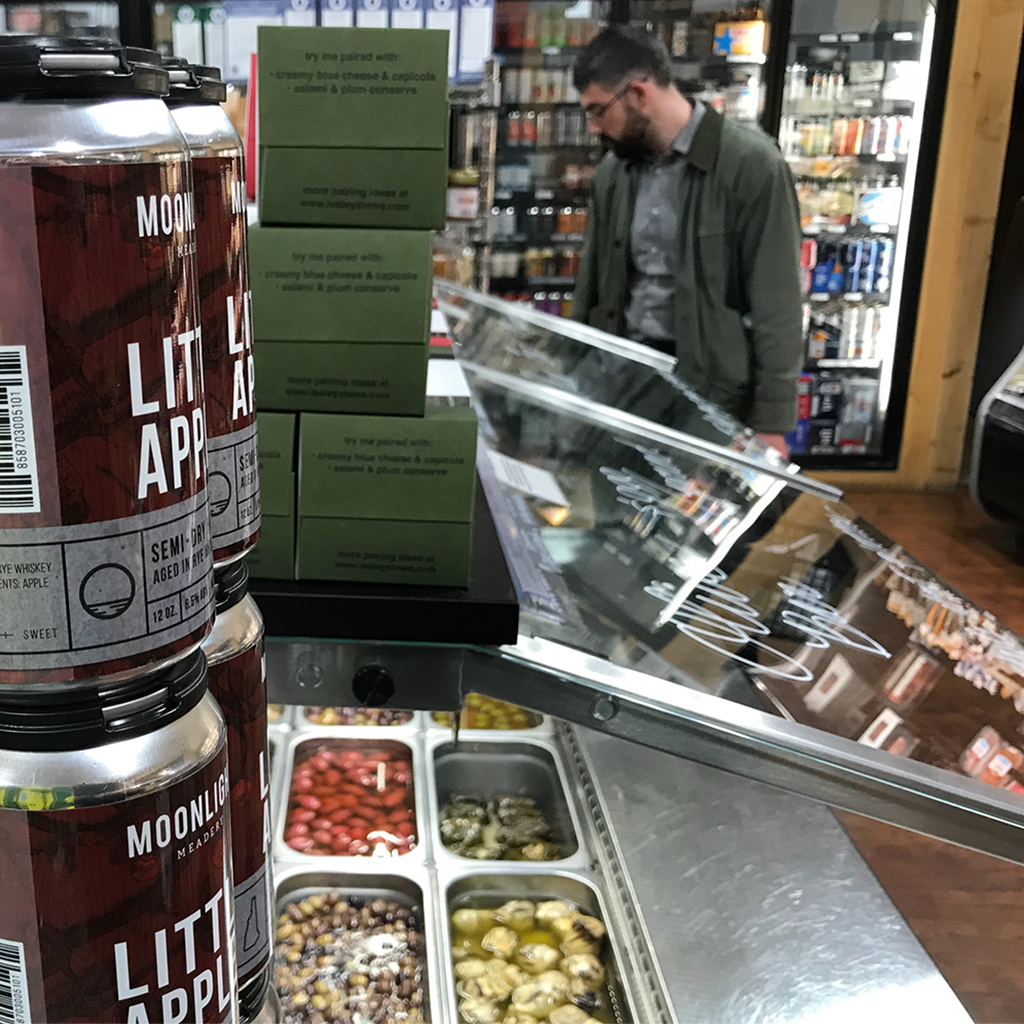
Just down the street from Spindler Confections, at 2225 Massachusetts Ave. is Pemberton Farms. Started in 1930 by Tofic Saidnawey as a fruit and vegetable stand (then at 2172 Massachusetts Ave.), Pemberton’s is now in its third generation of family ownership with Tom and Denna Saidnawey at the helm and nearing a century in business.
When Tofic Saidnawey died suddenly in 1948, his Aug. 26 obituary in the Chronicle noted that he was born in Syria and “came to this country as a boy of 16, became educated here and served in the Army in World War I. In business, in which he had established himself, his kindly and courteous manner made for him a host of patrons and friends.” Today’s generation of Saidnawey proprietors pride themselves on retaining their founder’s emphasis on quality and service to the community while adapting to the current needs of customers, including those with special dietary needs and those wanting to buy fair-trade products. In the past century, Pemberton’s has expanded significantly from its fruit-and-vegetable origins, and now offers a wide variety of food and spirits, as well as flowers and plants.
In the mood for a romantic dinner with your Valentine? Frank’s Steakhouse has been offering food and drink to patrons at its 2310 Massachusetts Ave. location for more than 80 years. Opened just across the street from its current location in 1938 and relocated to its current address in 1940, Frank’s is the oldest continuously operating steakhouse in the Boston area. No one really knows who “Frank” was. The land deed recorded in the city clerk’s office does list a “Frank Viano,” but locals have embraced a more colorful legend: a friendly neighborhood tippler named Frank was always in residence on the first barstool, and the story goes that the original owners, needing a name for the restaurant, decided to name it after this fixture in their establishment.
Frank’s second owner, “Red” O’Connell, capitalized on the mid-20th-century popularity of Chinese food, hiring a Chinese chef to expand the traditional steakhouse menu and adding Asian-inspired tropical drinks. After O’Connell passed away in 1974, Bill Ravanis Sr. bought the restaurant and returned it to its steakhouse roots. Ravanis’ sons, George and Bill Jr., have continued that tradition, making Frank’s arguably the most recognizable restaurant in North Cambridge.
Spindler Confections, Pemberton Farms and Frank’s Steakhouse are three of the landmark businesses that help to give the North Cambridge community its unique local flavor. Whether part of the neighborhood fabric for decades or new to the area but drawing on long-standing local traditions, these shops offer the chance to treat your Valentine while supporting local businesses (and learning a bit about neighborhood history). History Cambridge invites you to sign up for our newsletter to learn more about these and other fixtures of the community as we continue our Year of North Cambridge.
Beth Folsom is programs manager for History Cambridge.
This article was originally published in our “Did You Know?” column in Cambridge Day.

